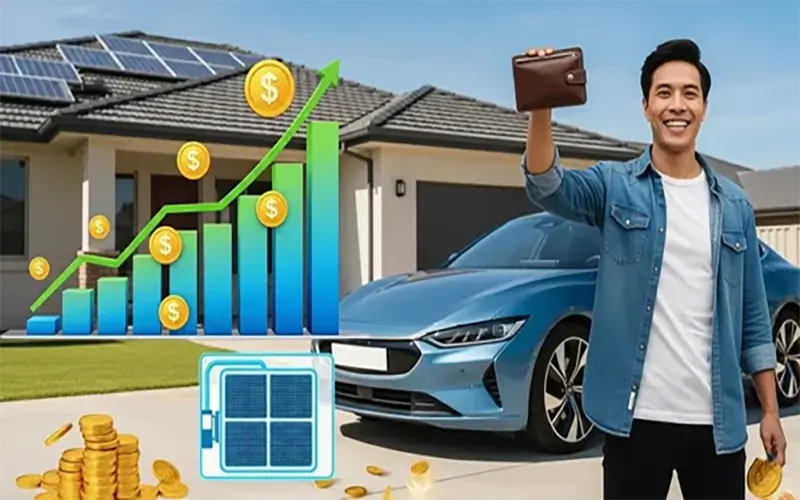While hydrogen fuel cell vehicles (FCEVs) are still a niche market, primarily due to limited refueling infrastructure and higher upfront costs, a closer look reveals a compelling case for their long-term financial benefits, especially when comparing them to traditional gasoline-powered cars. For the forward-thinking consumer or fleet operator, the long-term cost of ownership for an FCEV is a critical factor that could ultimately drive its adoption.
1. Zero Fuel Cost for a Period of Time
One of the most significant financial perks of early FCEV ownership is the generous “free fuel” programs offered by manufacturers. To help offset the high cost of hydrogen at the pump and encourage adoption, automakers like Toyota and Hyundai have provided new owners with a substantial fuel card. For example, some programs have offered up to $15,000 in complimentary fuel for purchases or a specified period of time. This completely eliminates the single largest ongoing cost of operating a gasoline car for several years.
2. Reduced Maintenance and Service Costs
Similar to their battery-electric counterparts, hydrogen fuel cell vehicles are models of mechanical simplicity compared to internal combustion engine (ICE) cars.
- Fewer Moving Parts: An FCEV’s drivetrain consists of a fuel cell stack, a small battery, and an electric motor. This eliminates the need for oil changes, spark plugs, timing belts, and complex exhaust systems.
- Less Wear and Tear: The vehicle’s electric motor provides instant torque and uses regenerative braking to slow down, which significantly reduces wear on the brakes. This means brake pads and rotors last much longer, leading to fewer and less expensive service visits.
- Focused Maintenance: Maintenance for FCEVs is primarily limited to routine checks such as tire rotations, air filter replacements, and software updates, which are less frequent and less costly than the exhaustive maintenance schedule of a traditional car.
While the fuel cell stack itself is a high-tech component, it is designed for a long lifespan. Automakers typically provide long-term warranties to cover any potential issues.
3. Government Incentives and Tax Benefits
Governments worldwide are recognizing the importance of hydrogen in a diversified clean energy future and are providing significant incentives to drive both infrastructure and vehicle adoption.
- Tax Credits and Rebates: FCEVs are often eligible for the same clean vehicle tax credits and rebates as battery-electric vehicles, which can substantially reduce the initial purchase price. For instance, in the U.S., a new FCEV may qualify for a tax credit of up to $7,500.
- Exemptions and Reduced Fees: Similar to BEVs, FCEVs can be exempt from certain road taxes, vehicle excise duties, and fees. They may also be exempt from urban congestion charges, offering daily financial savings for city commuters.
These incentives are crucial for bridging the gap between the higher retail price of FCEVs and the more affordable ICE and BEV options.
4. Depreciation and Resale Value
While there are fewer data points on FCEV depreciation compared to the burgeoning EV market, a few factors suggest a promising long-term outlook.
- Advanced Technology: As cutting-edge technology, FCEVs may hold their value well in the long run, particularly among early adopters and those in regions with a growing hydrogen infrastructure.
- Market Demand: For high-demand applications like commercial fleets, taxis, and heavy-duty trucks, the unique advantages of FCEVs—fast refueling and long range—are highly valued. This sustained commercial interest could create a robust second-hand market and help maintain resale value.
The Financial Challenge of Refueling
The primary financial challenge for FCEV owners today is the cost and limited availability of hydrogen fuel. While some production methods are becoming more efficient, the lack of widespread infrastructure and the complex process of storage and dispensing mean that hydrogen at the pump can be expensive. In some locations, the cost per mile can be higher than that of a home-charged EV, and even comparable to, or more expensive than, gasoline. However, as “green” hydrogen production scales up and a national distribution network is built, the cost is expected to fall dramatically.
While the initial purchase and current refueling costs can be a barrier, the long-term financial benefits of owning a hydrogen fuel cell vehicle are substantial and growing. The combination of manufacturer-sponsored free fuel programs, significantly lower maintenance costs, and a range of government incentives paints a picture of a vehicle that, over its lifetime, could be a smart and economical investment. As the hydrogen ecosystem matures and production costs fall, the financial case for FCEVs will only get stronger, making them a viable and compelling choice for the future of clean transportation.

